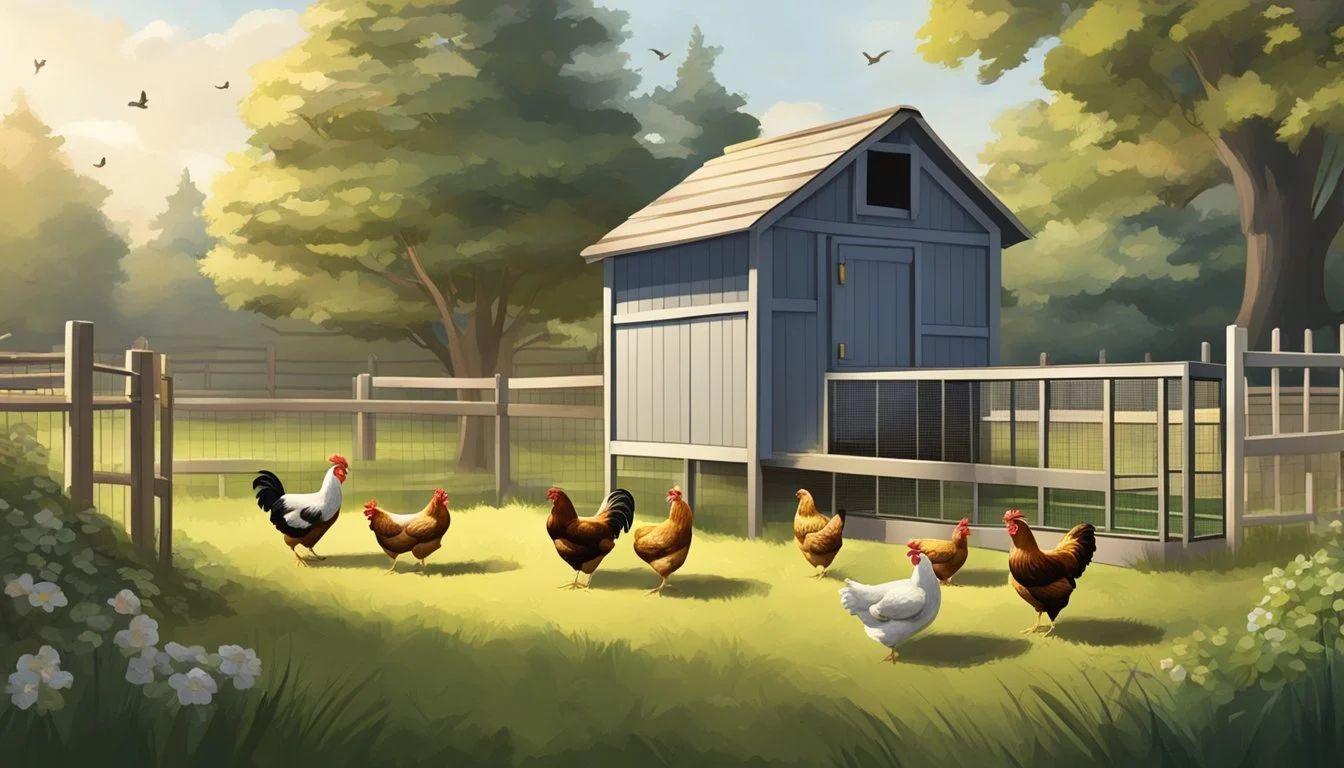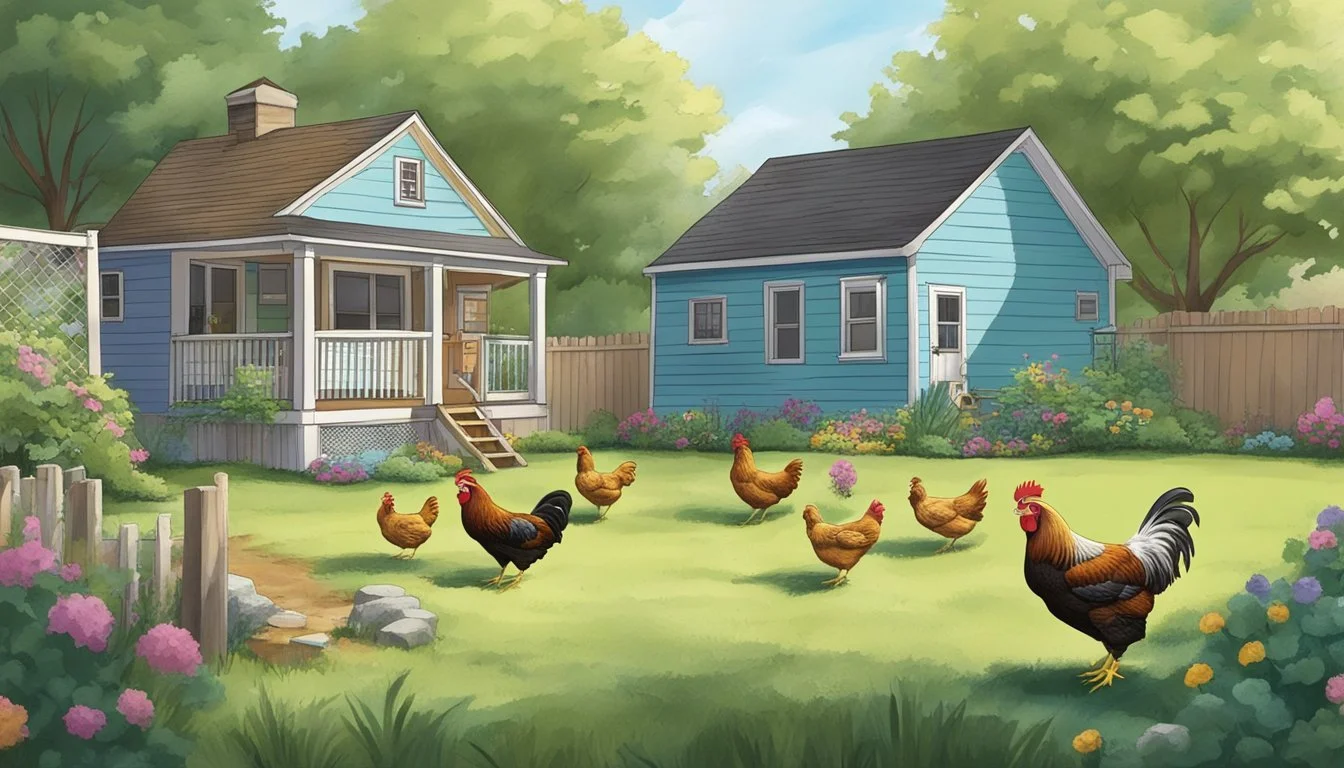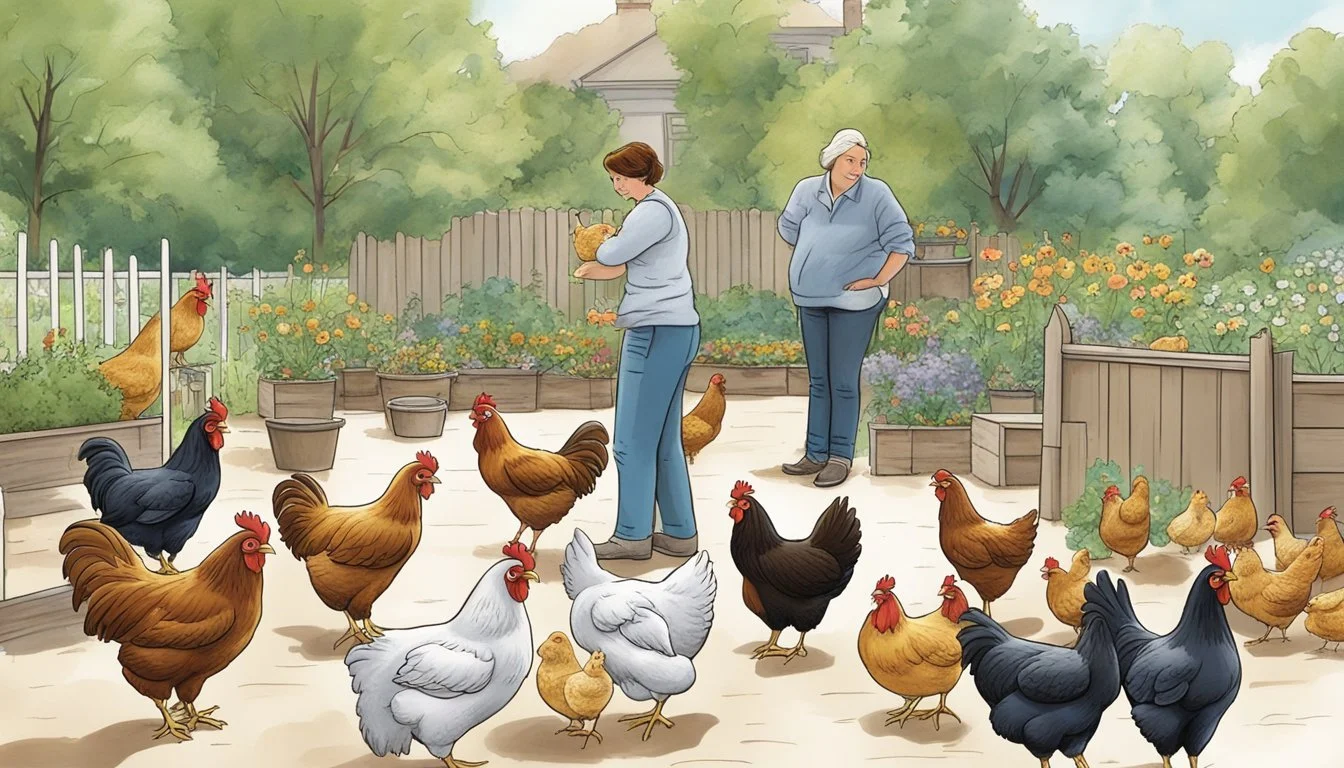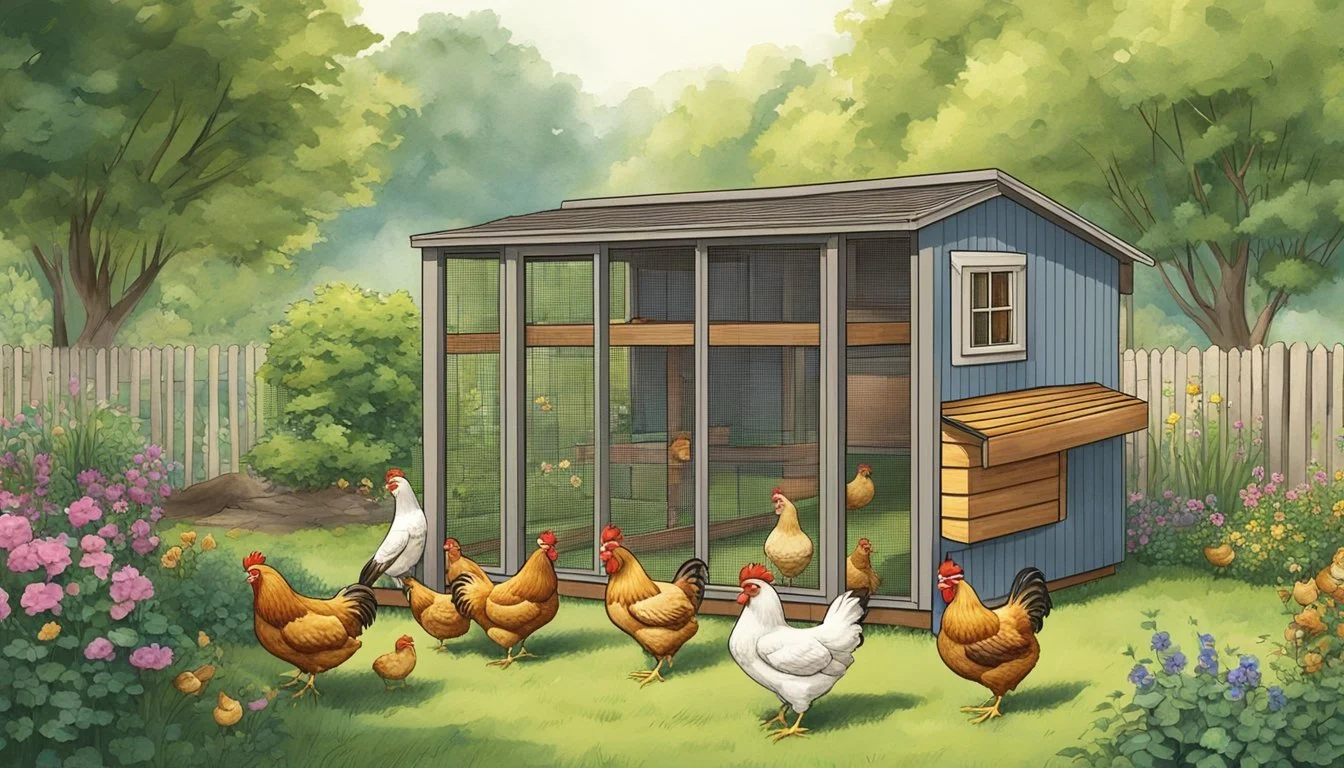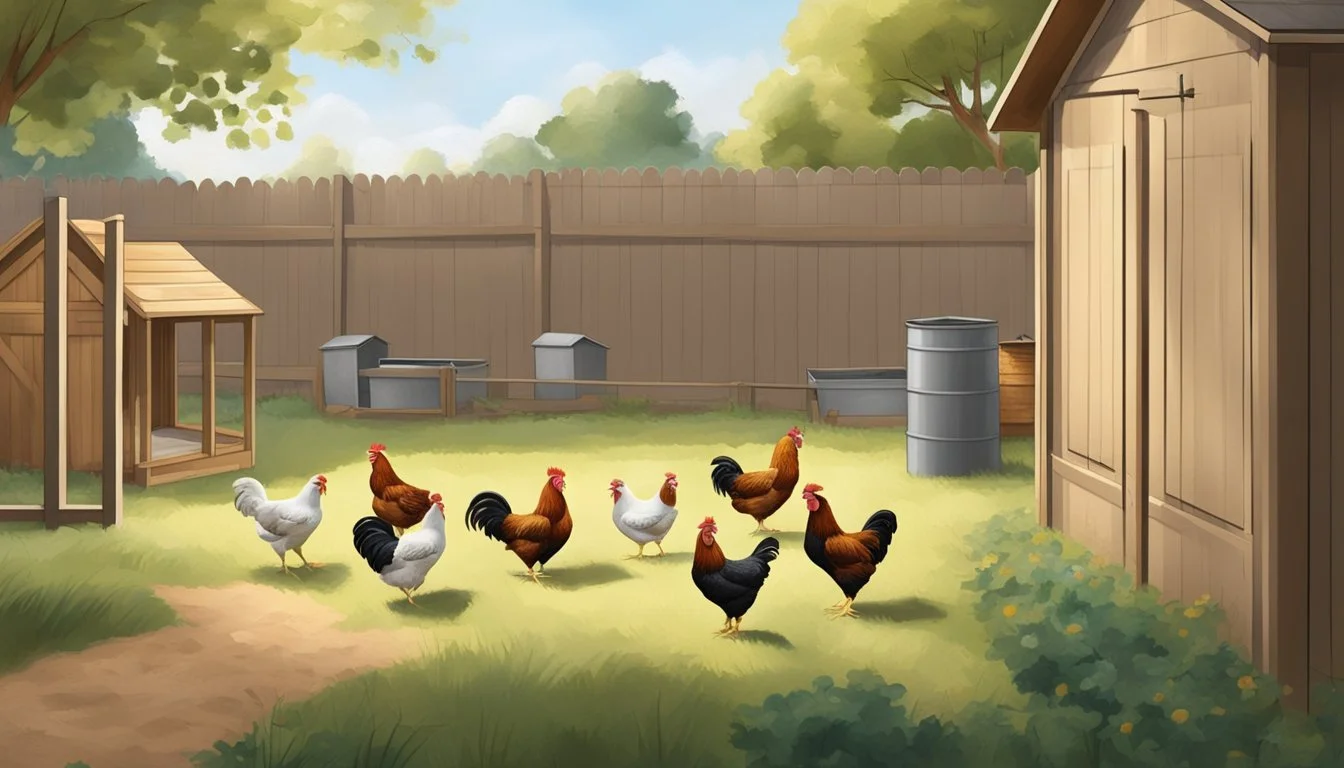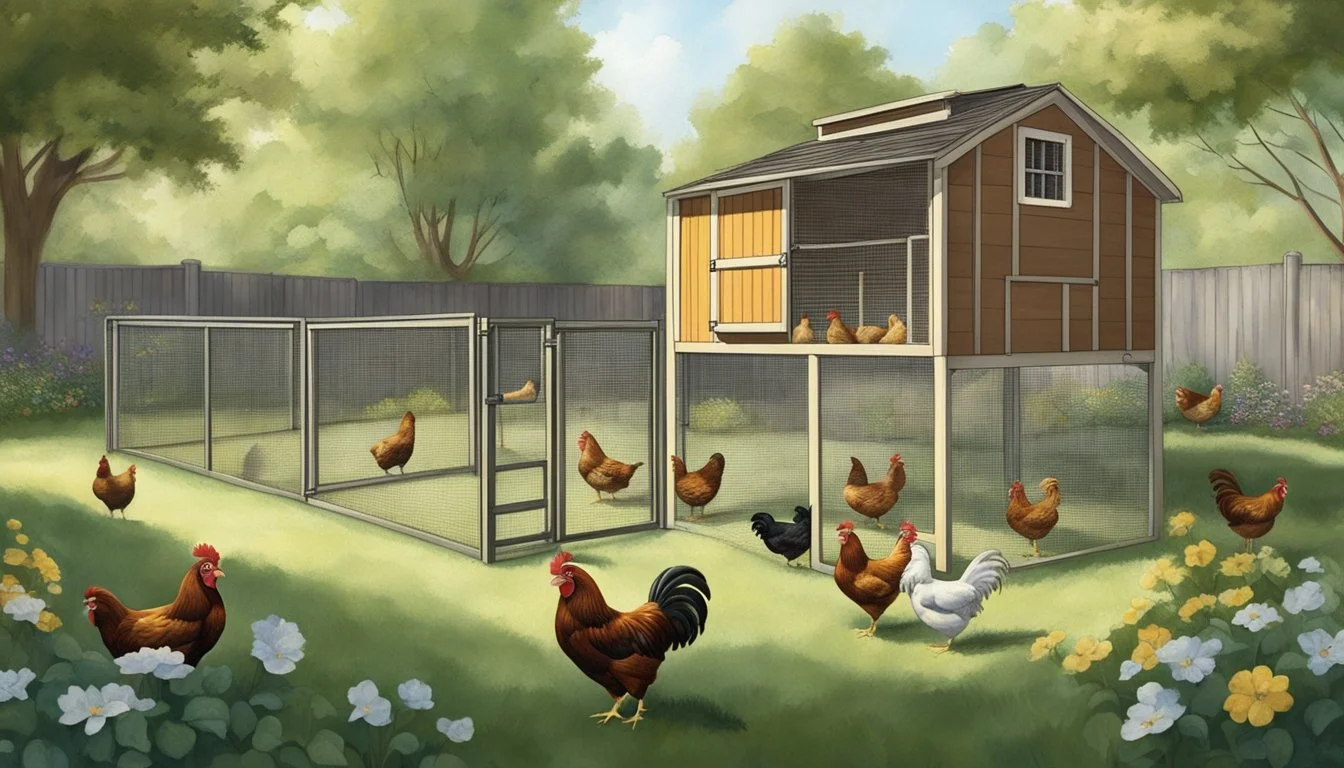Keeping Backyard Chickens in Cincinnati, OH
Essential Tips for Urban Poultry Farmers
The urban landscape of Cincinnati, Ohio, is seeing an increase in residents choosing to raise backyard chickens. This movement aligns with a growing interest in sustainable living, local food sourcing, and urban agriculture. Within Cincinnati's city limits, residents are permitted to keep chickens on their property, subject to specific regulations that aim to balance urban living with the responsibilities of keeping livestock.
In Cincinnati, the rules regarding the keeping of backyard chickens are designed to ensure the health and welfare of the birds, as well as to minimize any impact on neighboring properties. For example, while residents can have chickens in their backyards, the number allowed is contingent upon the size of their lot. Properties less than 10,000 square feet have a maximum limit of six chickens. Moreover, roosters are prohibited due to noise concerns, reinforcing the city's commitment to maintaining neighborhood peace.
Proper husbandry is emphasized in local ordinances to prevent issues such as odors, pests, and potential health risks. Requirements include keeping the chickens in clean, secure housing and not allowing them to roam freely. These regulations highlight the city's efforts to integrate hobby farming into the urban fabric while protecting community standards and animal welfare.
The Basics of Raising Backyard Chickens
When raising backyard chickens in Cincinnati, OH, one must prioritize the creation of a secure and comfortable habitat. A chicken coop is essential, providing shelter and protection from the elements and predators. It should be spacious, allowing for at least 3 square feet per chicken, ensuring adequate room for roosting and laying eggs.
Ventilation is equally important for the health of the chickens; a well-designed coop facilitates airflow while preventing drafts. Regular cleanliness is paramount to prevent disease—soiled bedding needs to be replaced, and droppings should be cleaned out frequently.
Here's a quick checklist for chicken care essentials:
Coop: Minimum of 3 sq ft per chicken
Ventilation: Adequate airflow without direct drafts
Cleanliness: Routine cleaning and waste management
Fresh Water: Constant access to clean drinking water
Diet: A balanced mix of feed, grains, and safe kitchen scraps
Attention: Daily observation for any signs of distress or illness
Chickens need constant access to fresh water and a balanced diet consisting of commercial poultry feed complemented by grains and vegetables. One should avoid giving them anything toxic like chocolate or avocados.
Responsible chicken care involves daily checks to ensure they are healthy, demonstrating normal behavior, and do not have any signs of injury or illness. Although raising chickens demands regular attention, the reward of fresh eggs and the joy of caring for these animals make it a fulfilling experience. The basics outlined provide a foundation for the successful rearing of backyard chickens, ensuring they thrive in their environment.
Understanding Cincinnati's Chicken Ordinance
In Cincinnati, residents can enjoy the benefits of raising backyard chickens, subject to a set of local regulations designed to ensure animal welfare and community harmony.
Overview of Local Chicken Laws
Cincinnati's chicken ordinance allows residents to keep chickens, but they must adhere to specific rules. These rules are in place to address potential concerns such as noise, odor, and property maintenance, and they help to ensure that chickens are raised in humane conditions that do not disrupt neighbors or the local environment.
Chickens Allowed: Residents are permitted to keep chickens within the city limits of Cincinnati.
Max Chickens Allowed: The number of chickens allowed varies by the size of the lot:
Lots less than 10,000 square feet: Maximum of 6 chickens
Lots between 10,000 to 20,000 square feet: Maximum of 12 chickens
Larger lots may have up to 24 chickens
Roosters Allowed: Roosters are not permitted due to noise concerns.
Coop Restrictions: Chickens must be housed in a secure coop and are often required to be kept a certain distance from property lines and neighbor dwellings to minimize odor and noise impact.
Residents seeking more detailed information can refer to the local ordinances or contact the city for clarification.
Legal Requirements for Keeping Chickens
The legal requirements for keeping chickens in Cincinnati are put in place to ensure poultry welfare and public health, as well as to prevent nuisance situations.
Permit Required: Generally, no permit is necessary; however, compliance with local ordinances is mandatory.
Registration: For flocks larger than 10 birds, the Ohio Department of Agriculture requires flock registration.
Adequate Shelter: Chickens must have appropriate shelter with sufficient space, food, water, and care.
Medical Care: Chickens must be provided with necessary medical attention to keep them healthy and prevent disease spread.
For additional details or to address specific concerns, residents can contact the city at (513) 352-3243 or visit the official Cincinnati website at www.cincinnati-oh.gov.
Selecting the Right Chicken Breed
When choosing breeds for backyard chickens in Cincinnati, potential poultry keepers should consider several factors. Size, purpose, temperament, and adaptability to the local climate are critical aspects.
Heritage Breeds are popular due to their adaptability and historical significance. Breeds like the Barred Rocks and Black Australorps are not only part of American poultry heritage but also have excellent egg-laying capabilities and hardy temperaments.
For those seeking smaller chickens, Bantams could be a choice; they are a miniature version of standard chickens and suitable for smaller spaces.
Egg Production is often a priority for chicken keepers. Breeds such as the Rhode Island Red are known for their prolific egg-laying. Here's how some popular breeds stand out:
Standard Large Fowl: These include breeds like the Rhode Island Red and Plymouth Rock, typically weighing 4-10lbs for hens.
Bantams: Smaller than standard breeds, making them ideal for modest backyards.
Jersey Giants: Despite their large size, they are known for being gentle and can get along with other breeds.
In conclusion, one should select a breed based on their specific needs, whether for egg production, space considerations, or a desire to maintain heritage breeds. Bearing in mind Cincinnati's urban setting, hens are preferable as they are quieter and do not face the regulatory issues roosters do.
Setting Up Your Chicken Coop
Setting up a chicken coop in your Cincinnati backyard requires careful planning to provide a safe and comfortable environment for your chickens. A well-designed coop should offer sufficient space and protect poultry from various predators.
Design Considerations for Coops
When constructing a chicken coop, space is a critical consideration. Ensure that there is a minimum of 3-4 square feet per chicken inside the coop to prevent overcrowding and maintain cleanliness. Good ventilation is equally important to provide fresh air and regulate temperature; hence, include vents or windows that can be secured to prevent predator access. While Cincinnati allows backyard chickens, roosters are usually prohibited within city limits due to noise concerns, so focus on housing hens only.
Ensuring Proper Protection from Predators
A sturdy coop must safeguard chickens from predators such as raccoons, which are adept at opening latches. Secure latches and heavy-duty fencing materials are essential. Consider the following protections:
Use hardware cloth instead of chicken wire for windows and runs, as it is more robust and secure.
Install locks that require multiple steps to open, which can be too complex for most predators to manipulate.
Bury the fencing at least 12 inches underground to deter diggers like foxes.
Ensure coops and runs are fully enclosed to prevent entry from predators that climb or fly.
Daily Care and Maintenance
When maintaining a chicken coop in the backyard, daily care is critical for the health and well-being of the chickens. One of the most essential tasks is ensuring cleanliness within the coop. Manure should be removed daily to prevent the build-up of ammonia and potential spread of disease.
Fresh Water: Chickens need constant access to clean, fresh water. Water containers must be checked and refilled every day to keep hens hydrated and healthy.
Feeding: They should be fed a balanced diet with a commercial feed which encompasses all necessary nutrients. Check feed levels daily.
Requirements Details Space Hens require adequate space to move, forage, and exhibit natural behaviors. Ensure their environment is not crowded. Nesting Boxes Check and clean regularly to provide a comfortable area for egg-laying. Ventilation Good airflow is vital for health; however, protect them from drafts. Predator Control Coops must be secured against predators, with inspections and adjustments as needed. Health Inspection Observe chickens daily for signs of illness or distress, acting swiftly on any issues.
An individual should be attentive to the behavior and physical appearance of their hens as changes can indicate health concerns. By establishing a routine for these tasks, one ensures a thriving backyard flock.
Health and Well-being of Your Chickens
Caring for chickens goes beyond providing feed and egg collection; it encompasses a spectrum of practices that uphold their health and welfare.
Daily Needs
Chickens require consistent attention to ensure they thrive in a backyard setting. Owners must supply fresh water daily to prevent dehydration, which can lead to serious health issues.
Nutrition and Foraging
For optimal health, chickens should have access to quality feed supplemented with the opportunity for foraging. This natural behavior not only contributes to their nutritional needs but also promotes physical exercise and mental stimulation.
Habitat and Cleanliness
Clean, spacious coops are crucial, as overcrowded or unhygienic conditions can lead to stress and the spread of diseases. Regular coop cleaning reduces the risk of infection and promotes a healthy environment.
Ventilation: Adequate airflow is essential to dispel dust and maintain fresh air.
Bedding: Absorbent materials like straw or shavings should be replaced frequently to manage waste and moisture.
Health Monitoring
Chickens must be observed for any signs of distress or illness. Early detection of changes in behavior or appearance often indicates a potential health concern.
Veterinary Care
Establishing a relationship with a veterinary care professional who has experience with poultry is recommended. They can provide routine check-ups, vaccinations, and urgent medical attention if needed.
It's imperative for residents in Cincinnati, OH, to stay informed about any local ordinances that might impact the care and keeping of backyard chickens, including registration requirements for larger flocks and coop specifications.
Benefits of Having Backyard Chickens
Keeping backyard chickens in Cincinnati offers several practical advantages for residents. One of the primary benefits is the ability to obtain fresh eggs. These eggs are often perceived as being of higher quality than those purchased at stores, primarily because backyard chicken keepers have direct control over their chickens' diets and living conditions.
Fertilizer production is another significant advantage. Chicken droppings can be composted and used to enrich garden soils, contributing to a more sustainable backyard ecosystem. This natural fertilizer is beneficial for growing vegetables and other plants.
For families with children, having backyard chickens provides an educational experience. Children learn about responsibility through the daily care chickens require. They also gain an understanding of where their food comes from and the process involved in egg production. Moreover, interacting with chickens can be a source of joy and encourages outdoor activity.
Backyard chickens also play a role in pest control. They eat various bugs, which helps to naturally reduce the population of unwanted insects in one's garden.
Here is a quick summary of the benefits:
Egg Quality: Enjoy fresh and nutritious eggs daily.
Garden Health: Use chicken waste as an effective and natural fertilizer.
Child Education: Teach children about animal care and the food cycle.
Pest Control: Reduce garden pests through chickens' natural foraging.
By maintaining a small flock, Cincinnati residents can enjoy these practical benefits while ensuring their chickens are well-cared for and happy.
Potential Challenges and Solutions
While keeping backyard chickens in Cincinnati offers rewards such as fresh eggs and compost materials, residents may face challenges related to noise and waste management. By understanding and addressing these issues, chicken keepers can maintain harmony both in their backyard and with their neighbors.
Managing Noise and Nuisance Issues
Chickens are naturally vocal animals, and while roosters are notably prohibited in Cincinnati due to noise concerns, hens can also contribute to nuisance noise levels. Noise from chickens typically includes clucking, especially after laying an egg, and can be a concern for close neighbors.
Solutions:
Enclosure Placement: Position chicken coops as far away from neighbors as possible to minimize disturbance.
Soundproofing: Implement sound-absorbing materials around the coop to reduce noise pollution.
Routine: Establish a consistent feeding routine that discourages excessive noise.
Dealing with Manure and Waste
Maintaining cleanliness is essential for both chicken health and neighborly relations. Chicken manure and waste need to be managed effectively to prevent odors and potential pest problems.
Solutions:
Regular Cleanup: Implement a daily or weekly cleanup routine to keep the coop and run area clean.
Composting: Chicken manure can be composted and used as fertilizer for gardens, but it must be done correctly to avoid odor and to kill pathogens.
Designated Areas: Use a designated area for waste to simplify management and composting processes.
By adhering to proper practices and local ordinances, Cincinnati residents can successfully navigate the challenges of backyard chicken keeping.
Community Engagement and Support
Engaging with the Cincinnati community is essential for backyard chicken keepers. The city offers a supportive network and a wealth of resources for residents interested in sustainable poultry keeping.
Connecting with Local Chicken Keepers
In Cincinnati, local chicken keepers have established communities to share advice, resources, and support. These groups offer a platform for discussion and facilitate connections among experienced and new poultry enthusiasts alike.
Cincinnati Backyard Chickens - Facebook: A private group where members can share stories, knowledge, and region-specific resources about poultry keeping.
City/Organization Contact: Cincinnati's municipal government potentially offers further assistance and clarification on backyard chicken regulations.
For those seeking direct communication channels, engaging with these groups can be a first step toward integrating into the local community of chicken keepers.
Additional Resources and Information
Cincinnati provides access to several resources that offer additional information on keeping backyard chickens:
Civic Garden Center of Greater Cincinnati: A hub for urban agriculture that includes education on keeping backyard chickens.
Location: 2715 Reading Road, Cincinnati, OH, 45206, United States
More information: Civic Garden Center Website
Chicken Laws and Regulations:
Link for Information: Information on local chicken laws can be found at ChickenLaws.com.
Additional Information:
Owners are to keep the number of chickens on smaller lots (less than 10,000 square feet) to a maximum of six.
Regular maintenance, such as daily cleaning of manure, is expected to adhere to city health and zoning codes.
The local legislation and organizations are keen on providing city dwellers with the necessary framework and educational material to maintain a sustainable poultry practice.
Regulations on Slaughter and Selling Eggs
When it comes to the slaughter of backyard chickens in Cincinnati, Ohio, residents must follow local health regulations and ensure humane treatment of the animals. Details on these regulations are best obtained from local authorities as they can vary and might be subject to change.
For those looking to sell eggs, Cincinnati regulations are generally accommodating. Sellers don’t typically require a permit or license to sell eggs directly from their farm, backyard, or residence. However, it's important for sellers to adhere to the Ohio Department of Agriculture's guidelines for egg selling which emphasizes cleanliness and food safety. Egg cartons should be labeled properly and any eggs meant for selling should be kept at a safe temperature to prevent spoilage.
To sell beyond direct transactions, such as in farmers' markets or to restaurants, sellers may need to follow additional guidelines. These may include:
Egg washing or sanitization
Use of new, clean cartons
Proper storage and transport to maintain freshness
The state of Ohio requires flock owners to register their flocks with the Ohio Department of Agriculture if they have more than 10 birds. Compliance with these regulations ensures the safety and health of both the poultry and the public consuming the products.
Requirement Description Permits/Licenses Not required for direct sales from backyard farmers. Other sales venues may have extra steps. Flock Registration Mandatory for flocks with more than 10 birds. Selling in Other Venues May require additional guidelines to be followed concerning egg sanitization and presentation.
By following these guidelines, residents can engage in the backyard chicken keeping experience while contributing to the local food economy.
Conclusion
In Cincinnati, residents have the privilege of keeping chickens in their backyards, subject to certain regulations. It is essential to recognize the benefits of such practices: chickens can contribute to a sustainable lifestyle by providing fresh eggs, reducing food waste through the consumption of table scraps, and naturally fertilizing gardens.
Key regulations to remember:
Maximum Number of Chickens: Residents may keep up to 24 chickens, depending on lot size.
Roosters: The city does not permit roosters due to noise concerns.
Chickens as Pets: While chickens are often considered pets, there may be restrictions regarding keeping them as indoor pets.
Responsibilities of Chicken Owners:
Maintain clean and hygienic living conditions.
Provide adequate space and shelter.
Adhere to all city ordinances to avoid penalties.
Chicken enthusiasts should verify details with local laws to ensure compliance, as regulations may vary and change over time. For those considering the addition of chickens to their lifestyle, they must be prepared for the commitment this entails. As with any pet, chickens require consistent care and attention.
By observing Cincinnati's regulations and managing chickens responsibly, residents contribute positively to the community, embrace urban agriculture, and enjoy the rewarding experience of backyard chicken keeping.


